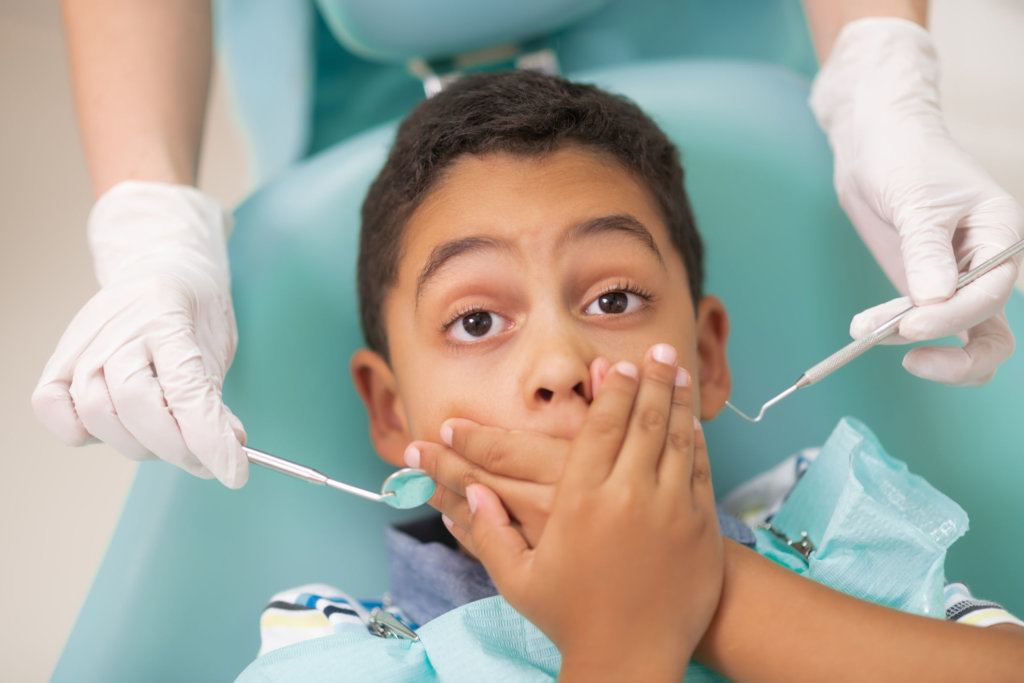
Children can have many different fears. Depending on their age, they may have a fear of strangers, monsters under their bed or dogs; and, along with a fear of seeing the doctor, some fear going to the dentist.
In fact, dentophobia, or anxiety associated with seeing the dentist, is fairly common. One out of five children will have a real fear of the dentist. The problem is that dental hygiene and care are very important to health, and skipping it can be really harmful. Over time some children just grow out of this fear. But others maintain their anxiety into adulthood, causing them to avoid dental care and eventually leading to health problems. Given that, how a child’s fear is managed can make a lifetime of difference.
Why do some kids fear of the dentist? Let’s face it, to a child, a stranger putting instruments or his or her hands into your mouth sounds alarming. It feels invasive as well. That there are parts of your mouth that can break or fall out is a disconcerting thought for a patient of any age. What’s more, the noises and feelings associated with undergoing dental care can make some children uneasy. Combine this with the fact that a dentist can potentially cause discomfort or pain, and you have a recipe for anticipatory anxiety.
[Read: Anxiety in Kids.]
So parents should be thoughtful about introducing children to dental care. Basically, the earlier you start seeing the dentist the better. Beginning with having an appointment to just count and lightly clean some teeth can set a precedent that dentist’s office is not a scary place.
Choose a pediatric dentist who is comfortable with young children, has a cheery office and knows how to speak with young kids in a gentle and reassuring way so that they feel calmer. Tell your child well in advance about the appointment.
Explain honestly but without too much detail that a dentist is someone who will simply check and clean the child’s teeth. Do not talk about all the things that could happen at the dentist’s office, because discussing things like getting fillings for cavities, root canals and shots will scare them with nothing gained.
Should your child ever need any of that, you can prepare the child for that ahead of time; but sharing scary details unnecessarily will only contribute to dentophobia. Similarly, do not discuss your own or other family members’ negative experiences with a dentist. Again, this can only serve to frighten kids, and children take a lot of their cues from parents. If you show them and tell them that the dentist’s office is a comfortable place, they will feel comforted.
[See: 9 Phobias That Are Surprisingly Common.]
If your child seems anxious nonetheless, you can show the child how it’s going to be. For example, demonstrate on the child’s doll or stuffed animal how the dentist might count and clean his or her teeth. Do this using your finger or a toothbrush, not an instrument, and with no sound effects — showing the child what the encounter might look like. You can let your child count your teeth, or brush them. The point is that dress rehearsals that feel calm and reassuring can carry through to the real thing.
Once at the office, keep your voice calm and reassuring. Distractions can be helpful while you wait and even in the dentist’s chair. Bringing a small toy to hold or play with, for example, can help. Some children might find it relaxing to listen to music while they have their teeth cleaned and checked, so bringing some music for them on your phone with headphones can make a real difference.
Do not speak to them about a big reward afterwards. If there needs to be a big reward, there must be something terrible that’s about to happen, right? However, after the appointment, do praise them for doing a good job, and you can consider giving the child a small reward like a sticker or little toy.
Don’t hold down or force a child to open their mouth. The point is to help kids to be less afraid. You can hold their hand while the dentist works, but for support and comfort.
[READ: What to Do About Your Child’s Bug or Spider Phobia]
It’s really important to help kids through this fear, so they can master it, because if it worsens and remains, it can truly affect their well-being as an adult. If all of the above measures are still not working, seeing a psychotherapist who is well-versed in treating childhood anxiety disorders can be helpful in treating this phobia.
More from U.S. News
10 Surprising Habits Killing Your Teeth
10 Healthy Teeth Habits From Dental Hygienists
7 Creative Soft Food Ideas to Ease Dental Procedure Recovery
Dentophobia: Managing a Child’s Fear of the Dentist originally appeared on usnews.com






